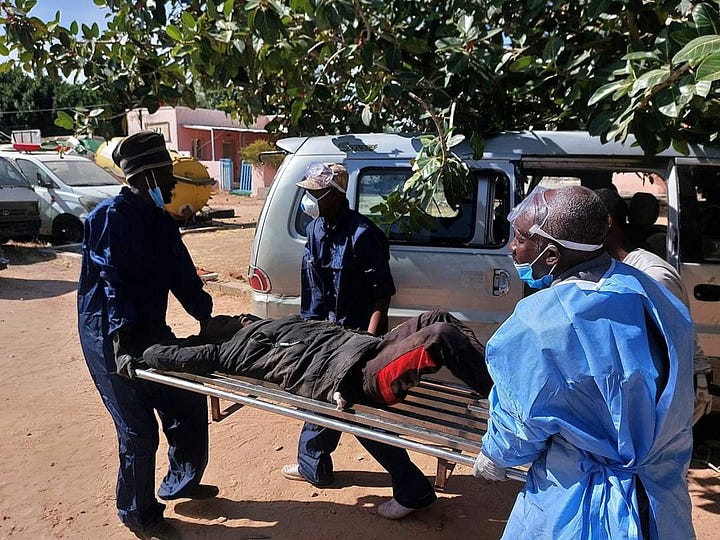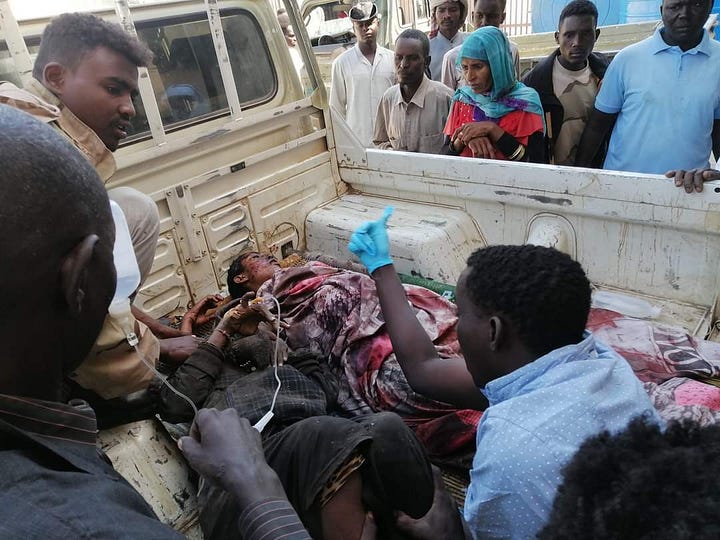Warplanes unleash brutal assault on Nyala
Dozens killed in indiscriminate bombing of South Darfur capital


The Sudan Air Force launched a brutal aerial assault Friday on Nyala, the capital of South Darfur, a city mostly untouched by war for the past two months. Children, women, and civilian men were among the victims.
Nyala’s people had lived through six months of battles between the army and the Rapid Support Forces (RSF) from April to October, including back-and-forth shelling in the city’s main market, government district, and surrounding neighborhoods.
After the fall of the army garrison in Nyala in October, the city of more than a million people has enjoyed relative calm and signs of a tentative recovery, albeit amid the oppression of war and economic crisis.
An air raid December 14 broke the relative calm. Last week, the city’s minority Christian population did not gather for the Christmas holiday, for fear of airstrikes. “This year, Christians in the city of Nyala in general did not celebrate Christmas to prevent gatherings for fear of military aircraft bombing the city. We were content with prayers,” said Alisa Garang, speaking to Radio Tamazuj.
Friday’s attack again shattered residents’ fragile hopes for a return to normalcy, and could cause a fresh wave of displacement.
Although there are military targets in Nyala, the Sudanese air force lacks precision weapons to accurately hit them in such a crowded setting. According to local sources, Friday’s attack struck civilians, not military targets, and it may have been intended to sow terror generally, or to hit particular neighborhoods on an ethnic basis.
The bombing was “indiscriminate” and violated international law, according to the Sudanese human rights organization Emergency Lawyers: “We condemn the condemn the continuing indiscriminate bombing that targets civilians in the city of Nyala, which exacerbates the severity of the humanitarian crisis that the city is experiencing and expands the circle of war, as there is no refuge for civilians.”
Such attacks help the RSF by galvanizing opposition to the military regime among the majority Arab population of South Darfur, as well as among some non-Arabs. Nyala is a diverse city and the airstrike victims come from many backgrounds.
A similar dynamic has played out in Khartoum’s sprawling outskirts, where airstrikes have killed hundreds of civilians from all ethnic backgrounds, bolstering recruitment efforts by the RSF outside their historically narrow ethnic base of support.
In a statement yesterday, the RSF pointed to the airstrikes as justification for continuing the war, in order to topple the military regime based in Port Sudan:
“This horrific crime comes within a long series of brutal crimes that have been committed by the Burhan militias and the terrorist brigades of the former regime. It has become clear that these criminal acts are being carried out selectively according to goals set to terrorize and displace the residents of Nyala, who enjoy security and stability after liberating the city from the filth of extremist remnants…
“We affirm that we will not tolerate these crimes... Our response will be to support the will of our great people by removing this gang that sparked this war, destroyed the country and displaced its people.
According to medical sources, the airstrikes killed and injured dozens of civilians. Dr. Muhammad Abakar, the acting emergencies director at the State Ministry of Health, said Friday that the death toll reached 26, with 19 seriously injured. He told Ayin that he expected the death toll to rise as some of the more gravely wounded victims die of complications from their injuries, due to a lack of specialists to treat them.
In a follow-up Saturday, Darfur 24, another established Sudanese media house, reported that the toll rose to 37 dead and 46 wounded. A correspondent for the outlet, who visited Nyala’s educational, specialized and Turkish hospitals, said that most of the victims were “children, women, and the elderly.”
Among the areas struck by bombs were the Riyadh neighborhood, Khartoum Bileil, Al-Jir neighborhood, where brick-makers were working, and the Al-Salam district, where two houses were destroyed as well as a Quranic school, which was damaged, but which fortunately was empty of students at the time of the air raid.
A video of one of the warplanes involved in the attack appeared to be an Antonov-26 or Antonov-30, but we were unable to make a definitive identification.
RSF loot humanitarian organizations
MSF (Doctors Without Borders) yesterday revealed that it evacuated staff from Wad Madani and suspended activities in Jezira State after RSF looted its facilities, saying, “On 19 December, armed men attacked the MSF compound, looting two cars and other items from its premises.” The organization said it is now concerned for the people Wad Madani who are left with very limited access to healthcare.
Similarly, the World Food Programme (WFP) said that “elements of Sudan’s paramilitary Rapid Support Forces broke into (our) warehouse and office, following their takeover of Wad Medani” in mid-December. The WFP warehouse contained more than 2,500 metric tons of pulses, sorghum, vegetable oil, and nutrition supplements, enough to feed nearly 1.5 million people for one month.
The food was meant for displaced people in Jezira State who had fled earlier fighting in the national capital Khartoum, as well as other vulnerable residents. WFP noted in a press release, “The specialized nutritious foods were intended to prevent and support malnutrition treatment for more than 20,000 children and pregnant and breastfeeding women through WFP-supported health centers.”
Justin Brady, the head of office of the UN Office for the Coordination of Humanitarian Affairs, said that the the coordinates of the WFP warehouse were shared with RSF “and we had assurances it would not be looted.”
In a related development, the UN Children’s Agency (UNICEF) successfully evacuated dozens of orphans from Wad Madani, including orphans from the Mygoma orphanage that was caught in the middle of fighting in Khartoum in the first weeks of the war, some of whom starved to death, and others who were evacuated to Wad Madani.
In brief
A meeting between the leaders of the two warring parties, originally scheduled to take place December 28, is now supposed to take place January 3, according to The East African, affiliated with Kenya’s main daily newspaper.
In a sign of a widening crackdown on civil society and opposition parties, the Governor of River Nile State threatened members of the Forces of Freedom and Change, saying, “I send a message to any traitor, agent, fifth columnist, collaborator with the rebel, or leader of Freedom and Change to leave the state within three days. I urge any member of the Freedom and Change Party who is in the state to pack their belongings and leave without delay.”
The Governor of Kassala State yesterday delivered a speech at a mosque, speaking in uniform, during which he called for “jihad, victory, and martyrdom,” asking civilians to take up arms to repel a feared attack by the RSF.
A Reuters investigation has identified key commanders among the RSF and allied Arab militias who were responsible for ethnic massacres against the Masalit.
Sudan Airways announced that it will resume operating direct flights between Cairo and Port Sudan twice per week (Saturday and Wednesday).
Al-Sharq al-Awsat reported plans for a meeting in coming days between former Prime Minister Abdallah Hamdok and the RSF leader, Mohamed Hamdan Dagalo. Hamdok heads a coalition of civilian parties trying to end the war.
Additional Videos from Nyala
Related coverage:
Support our journalism
Sudan War Monitor began as a volunteer project after the outbreak of war in April 2023. We use both journalism and open-source monitoring (OSINT) techniques to report on conflict events, identify perpetrators, and analyze conflict dynamics. If you like our work, please consider signing up for a paid subscription so that we can sustain our mission and continuously improve the quality of reporting.



